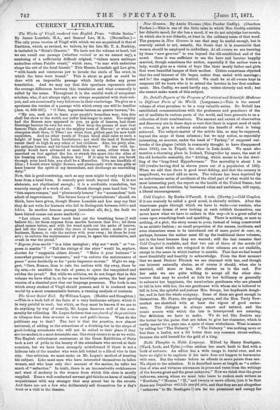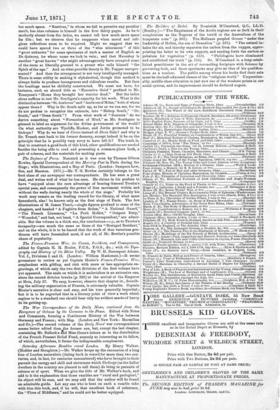Noble Thoughts in Noble Language. Edited by Henry Southgate.. (Ward,
Lock, and Tyler.)—One seldom has much fault to find with a book of extracts. An editor has a wide range to travel over, and we have no right to be captious if his taste does not happen to harmonize, with ours. Bat the volume before us offends in more points than one. We object to the selection. It is described more at length as "a collec- tion of wise and virtuous utterances in prose and verse from the writings. of the known great and the great unknown." Now we think that the great unknown, among whom we mast take leave to reckon such writers as " Rusticus," "Mamas," "H.," and twenty or more others, (can it be that. these are biloprivoni cro-A7S)v pool) 4wia, and that they are not altogether "
unknown" to Mr. Southgate ?) are far too prominent and occupy far
too much space. "Radials," in whom we fail to perceive any peculiar merit, has nine columns to himself in the first thirty pages. As he is modestly absent from the index, we cannot tell how much more space he fills ; but we observe that he reappears when moral and reli- gious reflections seem to be required. Might we suggest that we could have spared two or three of the "wise utterances" of this "great unknown" for some specimens of such a master of English as De Quincey, for whose name we look in vain ; and that Macaulay is another "great known" who might advantageously have occupied some of the room so liberally granted to a proser who calls himself "the Spirit of the age." And on what possible theory is Mr. Tupper unrepre- sented? And then the arrangement is not very intelligently managed. There is some utility in making it alphabetical, though this method is always liable to produce incongruous and ridiculous results. But then the headings must be skilfully constructed. We must not have, for instance, such an absurd title as "Excessive Grief " prefixed to Mr. Tennyson's "Home they brought her warrior dead." But the index alone suffices to test Mr. Southgate's capacity for his work. What is the distinction between "St. Ambrose" and "Ambrose of Milan," both of whom appear there ? Why is Dr. South split up, as far as we can see, for we do not profess to recognize the extracts, into "Bishop South," "Dr. South," and "Dean South"? From what work of " Socrates " do we derive something about "Formation of Mind," as Mr. Southgate is pleased to label an argument for the divine government of the world? On what authority are Wycliffe, Hooker, and Jortin promoted to be bishops ? Why do we hear of Canon instead of Dean Dale ? and why is Dr. Trench sent back to his former deanery, except indeed it be on the principle that he is possibly very sorry to have left it? The truth is, that to construct a good book of this kind, other qualifications are needed besides the being able to read and possessing a common-place book, a pair of scissors, and the materials for making paste.



































 Previous page
Previous page